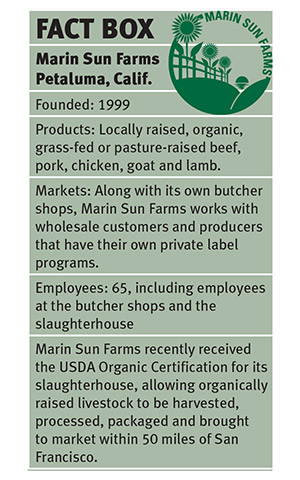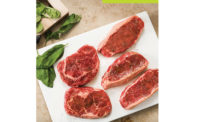The Bay area of California, including Marin and Sonoma Counties is known for its high-quality food. The wine, of course, is world-renowned, and the cheese is rapidly becoming the same. Could the same be said for its meat? The area is home to many grass-fed cattle ranches, as well as farmers who raise hogs, lambs, ducks and many other protein species. With the right infrastructure and a local foodie population that craves locally raised meats, those ranchers could develop some very profitable niche markets for themselves.
Take away that infrastructure, though, and the whole community suffers. The unexpected closing of the area’s one slaughterhouse in Petaluma last year left area farms with few alternatives to get their animals slaughtered and processed into fresh cuts. The facility was eventually acquired and reopened, thanks to an entrepreneurial company that had been pushing the “Think Local” movement before it was even a movement.
 Marin Sun Farms garnered national recognition when it acquired the Petaluma facility from the former owners, Rancho Feeding Corp., in March 2014. However, the company has been steadily growing its presence and its capabilities since 1999, and David Evans, the founder and CEO of the company, has ties to the land that date back much further.
Marin Sun Farms garnered national recognition when it acquired the Petaluma facility from the former owners, Rancho Feeding Corp., in March 2014. However, the company has been steadily growing its presence and its capabilities since 1999, and David Evans, the founder and CEO of the company, has ties to the land that date back much further.
Marin Sun Farms specializes in grass-fed, pasture-raised, and foodshed meats. Some of the livestockcomes from Evans’ own farm, with the rest from other area ranchers who operate under a strict set of guidelines that Marin Sun Farms has established.
Evans says that Marin Sun Farms works hand-in-hand with people “who are making a strong effort in contributing to building a more sustainable food future. People who are showing that they care about their soils. They care about their water use. They care about the environment that the livestock are raised and the humane handling of the livestock, and they really care about what the final consumer thinks about what they did. That model, for us, feeds our mission statement of building a more sustainable food model that we’re continuously working on.”
Evans notes that Marin Sun Farms is not a “sustainable” meat company in the truest definition — but something it will always work towards. He likens sustainability to world peace — a noble goal that is not really attainable. However, by striving toward world peace, people can create a more peaceful world.
“In the same logic, by always evaluating more sustainable practices and implementing sustainability, we will become as sustainable as we can achieve,” Evans adds. “I think that that’s a very noble effort in a for-profit business, and those values carry us.”
Evans grew up on his family’s farm in nearby Point Reyes Station, and after graduating from Cal Poly San Luis Obispo in 1996, he began to look for ways to expand that business.
At the time, the grass-fed cattle movement was gaining traction in some parts of the country, but not in California. Evans also was looking at the area dairies like Straus Family Creamery that were enjoying success with locally made organic dairy products.
“I saw an opportunity to start a company that would be an extension of our family ranch and our family history here, where we could bring a product direct to market,” he says. “In the past, we’d always just sold calves through brokers off to fed lots or grow-out facilities. I wanted to try to bring that product to the consumer directly. I thought that we have enough awareness here in the Bay Area.”
Evans saw the possibilities for the area ranchers to have their own branded products.
“[If] we have the land and we have the people and we have the market, then we just need to develop opportunity to bring these products to the market. That creates economic stability,” he says.
Through the hard work of its team, Marin Sun Farms has realized this vision and become a force in the local meats market.
Despite the fact that Evans did not have a meat processing background, he knew that he eventually would have to go in that direction. His family’s grass-fed cows provided excellent meat, but he struggled to get the quality cuts and packaging that he needed from area packers and processors. By leasing space in a USDA facility in San Francisco, Marin Sun Farms got its start, and Evans was able to produce his quality product. The San Francisco culinary community and consumers were very receptive to the meat’s qualities (grass-fed, antibiotic-free, locally raised), which led to increased demand.
In addition to selling its branded products in specialty markets and select restaurants, Marin Sun Farms also operates two butcher shops in Point Reyes Station and Oakland. The Point Reyes Station is also a restaurant; along with some mouth-watering burger options (including a lamb burger with Manchego cheese, lamb bacon and chimichurri sauce), customers can select their cut from the meat case and have the chef prepare it.
Before settling into its (hopefully permanent) home in Petaluma, Marin Sun Farms had to relocate several times. The company that initially leased space to Evans went out of business, so Marin Sun Farms moved to an empty facility in 2013. After making significant investments into that plant, the area’s only slaughterhouse shut down in early 2014 and became available for purchase.
Evans notes that he had been interested in the Petaluma facility for more than a decade and had spoken with the previous owners about acquiring it. Still, the closing of the plant was very unexpected and sent shockwaves throughout the surrounding agricultural communities.
“I had no idea that it was going to become available when it did or as rapidly as it did, but it did. I was in a good position to put together the investment and purchase the facility,” he says.
While it didn’t happen in the time frame or the manner that Evans had expected, Marin Sun Farms had settled on its ideal location and gained the new capability to slaughter its own cattle.
Grace under pressure
Evans may not have been well-versed in the processing industry when he launched Marin Sun Farms, but he was able to turn it into a popular and successful company. Adding a slaughter operation at a time when many companies are getting out of the slaughter business was the next challenge.
“One of the things that was really important to us when we opened the slaughterhouse was that we were working really closely with the community and all of California’s ranchers to really understand the services that they needed,” says AnnaRae Grabstein, director of operations. She joined the company after the acquisition of the facility to help develop the program and work with the producers.
“It was a really great process for us to learn a lot about each of the ranchers, and be cognizant of how these private label producers want to bring their product to market and what they need in order to do that,” she adds.
As Marin Sun Farms took over the facility, there was a sense of urgency to get it up and running as fast as possible.
“We had lots of small producers in the North Bay, including us, who were on the verge of going out of business without the facility,” Evans recalls.
The closest slaughter facilities were over 100 miles away. If the plant remained closed, producers had the unenviable task of setting up a costly, long-distance transportation method if they wanted to maintain a product supply.
“The longer the slaughterhouse stayed shut down, the harder it was going to be to get it back open,” he adds. “We were going to lose customers. Customers were going to find other places to go. They’re going to set up transportation systems. Maybe they’re going to move animals to new locations.”
Evans says he worked closely with the North American Meat Institute as well as his local FSIS office in Alameda. Everyone involved was very aware of the importance in opening the area’s last slaughterhouse as quickly as possible.
“Everyone did a marvelous job. We put together the programs. We worked very hard with very little sleep,” he says. “We were able to process our reopening in a time frame that we all felt comfortable with. It was remarkable.”
Fortunately, the facility itself was in relatively sound shape. It is an older building, and Marin Sun Farms gradually has been upgrading systems and equipment, but there were no major repairs or renovations to get the plant reopened. Of far greater importance was the development of a tracking system for livestock. Evans says that the system the team developed has been highly regarded by USDA staff.
“It tracks every animal that comes, from the time it shows up on the property, with all of its background paperwork, to when the carcass leaves the property. We have all of that documented internally. We have data that’s collected all along that process,” he explains. “That was quite an initial undertaking and we’re very, very pleased with the information that it provides us.”
Since the re-opening of the Petaluma facility, the company has slowly scaled up its capabilities. Grabstein says that the company initially slaughtered only cattle and hogs, even though there was a demand for sheep and goats from area producers as well.
“We waited a full six months before we decided to roll out the sheep and goat program because we wanted to make sure that we were going to succeed at the task at hand and not make mistakes — not only to not make mistakes but to really be the best in the business,” she says.
Marin Sun Farms, after all, got its start when Evans couldn’t get the quality beef products he needed from any company. The last thing the company wanted would be to subject producers to those same frustrations.
“It was of critical importance to us as we embarked on our slaughterhouse that the quality that people were going to get was going to be better than they could find anywhere else,” Grabstein says. “We’ve gotten that feedback from people, and we’re really, really proud of the work that our crew is doing. Sometimes it does take longer, but what comes out at the end is something that we can be really proud of.”
Under previous ownership, the plant was slaughtering 70% culled dairy cattle from the area and 30% private label business from small local ranchers. The focus is now entirely on those small producers and their specialty products. The hope is that they will continue to grow thanks to Marin Sun Farms’ capabilities, and new producers will come on board with their own programs.
“People say often, ‘How many small farms do you work with?’ but that’s not the case,” Evans explains. “We’ll work with any small farm in California that can bring us high quality meat and that is mission-driven and cares about the sustainability of California’s productivity off into the future.”
Evans still produces cattle and chickens for Marin Sun Farms from his family farm, and the company gets the rest of its branded products from local producers. Thanks to the weather patterns in California, the company is able to supply beef, pork and chicken year-round. Other meats, like turkey and goat, are done on a more seasonal basis.
A year into the new facility, Evans says that he is very pleased with the company’s progress, from an operations and economic standpoint. The addition of a processing aspect to the plant’s operations gives producers the opportunity to have products cut and wrapped to their specifications. Marin Sun Farms can even distribute products throughout California and to Las Vegas. Those services will only encourage more producers to come on board with Marin Sun Farms, which will help to ensure that there is enough work to keep the plant operating five days a week.
Evans also points out that the wider acceptance of organically or naturally raised, local meats can help move the entire meat industry to the next evolutionary step.
“The industry swelled to a great point just on the idea of cheap protein. I think we’re having to rethink that,” he reasons. “It’s opened up niches for companies like mine to get started and find demand, and all of this will move the industry forward. I think we’re in the middle of a large paradigm shift when it comes to meat and meat production right now.”
It is noteworthy that the success of local programs, including Marin Sun Farms, has helped connect a large urban center like San Francisco to its rural neighbors.
“A good percentage of people in San Francisco are relating to their meat and back to the landscape and people growing it here in the North Bay. That’s monumental, that people are deciding to spend on it to support the farms,” he says.
“A huge part of this is reconnecting the urban and rural. When we reach our threshold where the majority of our voting populace lives in urban areas and aren’t connected to the rural resources that supply them, that imbalance creates a severe political problem. So, I’m all about reconnecting,” he says. “When people are connected they care, and that care leads to better decision-making. Maybe we can do something here that will spark appreciation elsewhere.”








Report Abusive Comment